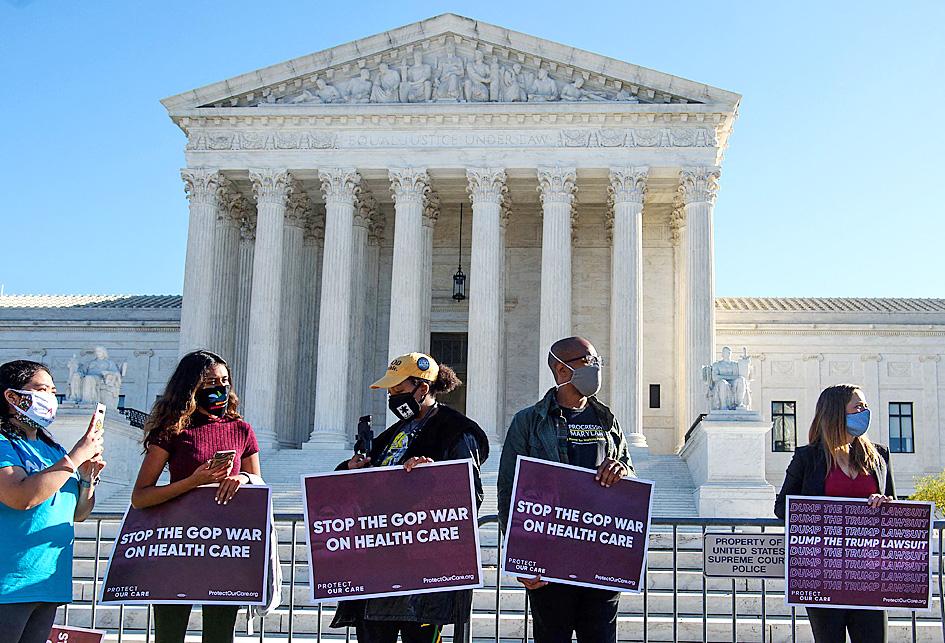The US Supreme Court on Thursday dismissed a major challenge to a US health care law introduced by the administration of former US president Barack Obama, turning aside an effort by Republican-led states to throw out the law that provides insurance coverage for millions of Americans.
The Supreme Court justices, with a vote of a seven to two, left the entire Affordable Care Act (ACA) intact in ruling that Texas, other Republican Party-led states and two individuals had no right to bring their lawsuit in federal court. The administration of US President Joe Biden says 31 million people have health insurance because of the law popularly known as “Obamacare.”
The law’s major provisions include protections for people with pre-existing health conditions, a range of no-cost preventive services and the expansion of the Medicaid program that insures lower-income people, including those who work in jobs that do not pay much or provide health insurance. Also left in place is the law’s now-toothless requirement that people have health insurance or pay a penalty.

Photo: AFP
The US Congress rendered that provision irrelevant in 2017 when it reduced the penalty to zero.
The elimination of the penalty had become the hook that Texas and other Republican-led states, as well as the administration of former US president Donald Trump, used to attack the entire law. They argued that without the mandate, a pillar of the law when it was passed in 2010, the rest of the law should fall, too.
And with a more conservative Supreme Court that includes three Trump appointees, opponents of Obamacare hoped that a majority of the justices would kill off the law they have been fighting against for more than a decade.
However, the third major attack on the law at the Supreme Court ended the way the first two did, with a majority of the court rebuffing efforts to gut the law or get rid of it altogether.
Trump’s three appointees to the court, Supreme Court justices Amy Coney Barrett, Neil Gorsuch and Brett Kavanaugh, split their votes. Kavanaugh and Barrett joined the majority. Gorsuch was in dissent, signing on to an opinion from Supreme Court Justice Samuel Alito.
Supreme Court Justice Stephen Breyer wrote for the court that the states and people who filed the federal lawsuit “have failed to show that they have standing to attack as unconstitutional the Act’s minimum essential coverage provision.”
In dissent, Alito wrote: “Today’s decision is the third installment in our epic Affordable Care Act trilogy, and it follows the same pattern as installments one and two. In all three episodes, with the Affordable Care Act facing a serious threat, the Court has pulled off an improbable rescue.”
Alito was a dissenter in the two earlier cases, as well.
Larry Levitt, an executive vice president of the nonprofit Kaiser Family Foundation, said that the healthcare law is “here to stay for the foreseeable future.”
“Democrats are in charge and they have made reinvigorating and building on the ACA a key priority,” Levitt said. “Republicans don’t seem to have much enthusiasm for continuing to try to overturn the law.”
Republicans US lawmakers have been pressing their argument to invalidate the law even though congressional efforts to rip out the entire law “root and branch,” as US Senate Minority Leader Mitch McConnell called it, have failed.
The closest they came was in July 2017 when then-US Senator John McCain, who died the following year, delivered a dramatic thumbs-down vote to a repeal effort by fellow Republicans.
In December 2016, just before Obama left office and Trump swept in calling the ACA a “disaster,” 46 percent of Americans had an unfavorable view of the law, while 43 percent approved, a Kaiser Family Foundation poll showed.
Those ratings flipped, and by early this year, 54 percent had a favorable view, while disapproval had fallen to 39 percent, foundation data showed.

‘IN A DIFFERENT PLACE’: The envoy first visited Shanghai, where he attended a Chinese basketball playoff match, and is to meet top officials in Beijing tomorrow US Secretary of State Antony Blinken yesterday arrived in China on his second visit in a year as the US ramps up pressure on its rival over its support for Russia while also seeking to manage tensions with Beijing. The US diplomat tomorrow is to meet China’s top brass in Beijing, where he is also expected to plead for restraint as Taiwan inaugurates president-elect William Lai (賴清德), and to raise US concerns on Chinese trade practices. However, Blinken is also seeking to stabilize ties, with tensions between the world’s two largest economies easing since his previous visit in June last year. At the

UNSETTLING IMAGES: The scene took place in front of TV crews covering the Trump trial, with a CNN anchor calling it an ‘emotional and unbelievably disturbing moment’ A man who doused himself in an accelerant and set himself on fire outside the courthouse where former US president Donald Trump is on trial has died, police said yesterday. The New York City Police Department (NYPD) said the man was declared dead by staff at an area hospital. The man was in Collect Pond Park at about 1:30pm on Friday when he took out pamphlets espousing conspiracy theories, tossed them around, then doused himself in an accelerant and set himself on fire, officials and witnesses said. A large number of police officers were nearby when it happened. Some officers and bystanders rushed

Beijing is continuing to commit genocide and crimes against humanity against Uyghurs and other Muslim minorities in its western Xinjiang province, U.S. Secretary of State Antony Blinken said in a report published on Monday, ahead of his planned visit to China this week. The State Department’s annual human rights report, which documents abuses recorded all over the world during the previous calendar year, repeated language from previous years on the treatment of Muslims in Xinjiang, but the publication raises the issue ahead of delicate talks, including on the war in Ukraine and global trade, between the top U.S. diplomat and Chinese

RIVER TRAGEDY: Local fishers and residents helped rescue people after the vessel capsized, while motorbike taxis evacuated some of the injured At least 58 people going to a funeral died after their overloaded river boat capsized in the Central African Republic’s (CAR) capital, Bangui, the head of civil protection said on Saturday. “We were able to extract 58 lifeless bodies,” Thomas Djimasse told Radio Guira. “We don’t know the total number of people who are underwater. According to witnesses and videos on social media, the wooden boat was carrying more than 300 people — some standing and others perched on wooden structures — when it sank on the Mpoko River on Friday. The vessel was heading to the funeral of a village chief in